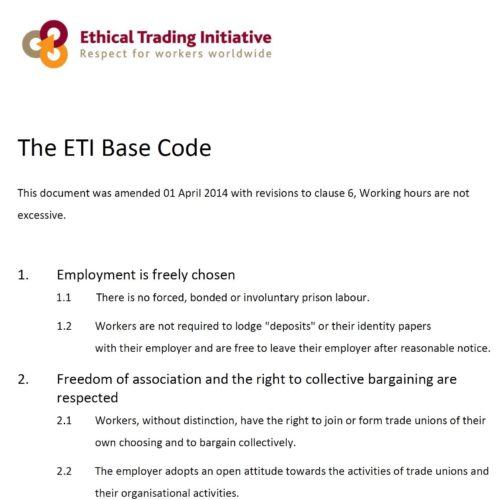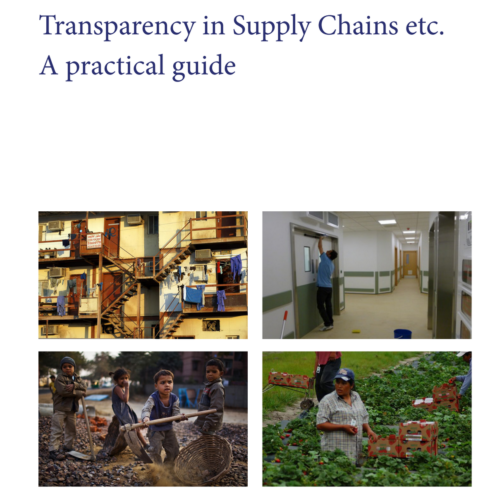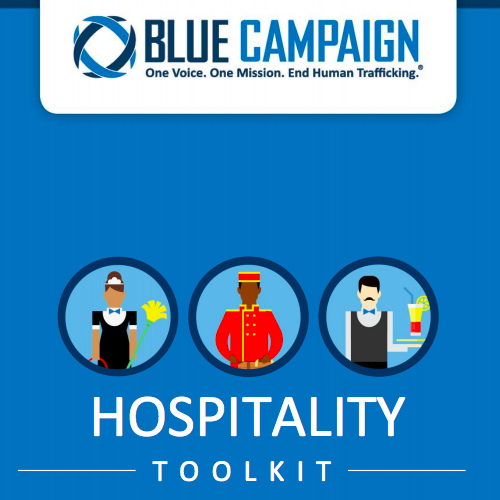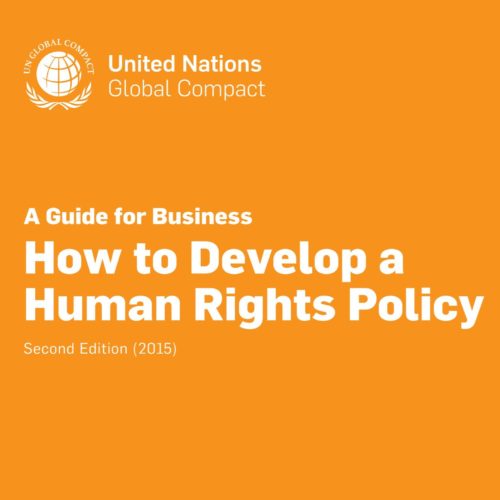-
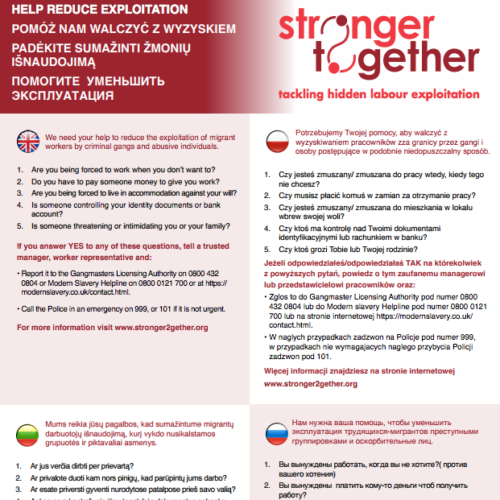 Stronger Together is a multi-stakeholder initiative which aims to reduce modern slavery. It provides guidance, training and resources to organisations, employers, labour providers, workers and their representatives. This free collection of resources includes pragmatic guidance and toolkits, and resources for the workplace including multilingual posters, leaflets and template policies. This leaflet is intended for distribution in the workplace, and asks employees five basic questions to raise awareness of exploitation and encourage those who may be unwittingly exploited to report their abuse. It is published in 8 languages.
Stronger Together is a multi-stakeholder initiative which aims to reduce modern slavery. It provides guidance, training and resources to organisations, employers, labour providers, workers and their representatives. This free collection of resources includes pragmatic guidance and toolkits, and resources for the workplace including multilingual posters, leaflets and template policies. This leaflet is intended for distribution in the workplace, and asks employees five basic questions to raise awareness of exploitation and encourage those who may be unwittingly exploited to report their abuse. It is published in 8 languages. -
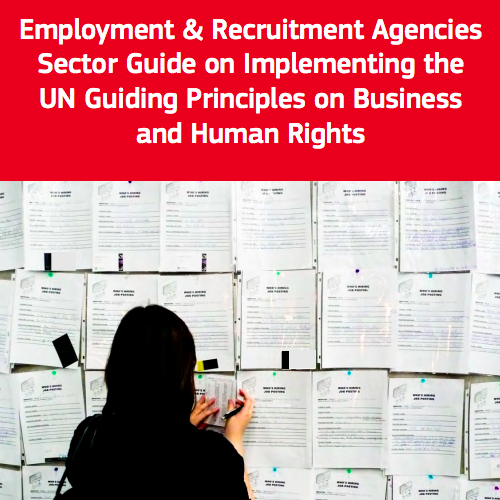 This Guide applies the UN Guiding Principles on Business and Human Rights to the specific context of employment and recruitment agencies. Recognising that each company is different, it is intended to help agencies “translate” respect for human rights into their own systems and company cultures. In December 2011, IHRB and Shift were selected by the European Commission (Directorate-General for Enterprise and Industry) to develop sector-specific guidance on the corporate responsibility to respect human rights, as set out in the UN Guiding Principles on Business and Human Rights.
This Guide applies the UN Guiding Principles on Business and Human Rights to the specific context of employment and recruitment agencies. Recognising that each company is different, it is intended to help agencies “translate” respect for human rights into their own systems and company cultures. In December 2011, IHRB and Shift were selected by the European Commission (Directorate-General for Enterprise and Industry) to develop sector-specific guidance on the corporate responsibility to respect human rights, as set out in the UN Guiding Principles on Business and Human Rights.Credit: Shift & Institute for Human Rights and Business (IHRB)
-
 Stronger Together is a multi-stakeholder initiative which aims to reduce modern slavery. It provides guidance, training and resources to organisations, employers, labour providers, workers and their representatives. This free collection of resources includes pragmatic guidance and toolkits, and resources for the workplace including multilingual posters, leaflets and template policies. This template is to be modified as required and for inclusion with a wider Tackling Modern Slavery in Business and Supply Chain or Business Human Rights Policy.
Stronger Together is a multi-stakeholder initiative which aims to reduce modern slavery. It provides guidance, training and resources to organisations, employers, labour providers, workers and their representatives. This free collection of resources includes pragmatic guidance and toolkits, and resources for the workplace including multilingual posters, leaflets and template policies. This template is to be modified as required and for inclusion with a wider Tackling Modern Slavery in Business and Supply Chain or Business Human Rights Policy.Credit: Stronger Together
-
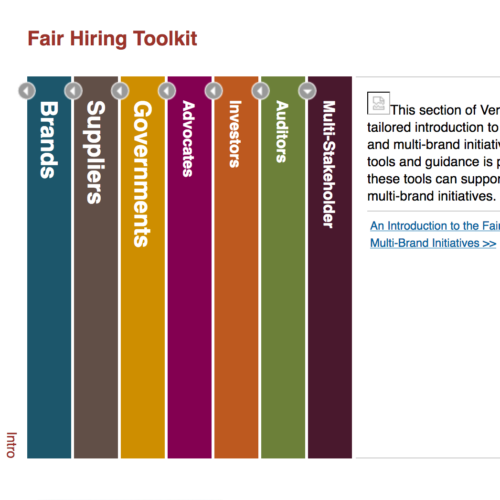 The Fair Hiring Toolkit is a resource which addresses fair hiring practice and responsible recruitment of migrant workers in global supply chains. It focuses on all levels of an organisation to tailor tools and advice appropriately and is a step-by-step process of how to implement trafficking-free supply chains. This includes providing a Framework for Action for brands and suppliers, and supplying guidance for governments, advocates, investors, auditors and other stakeholders. The Frameworks offer advice on: - Improving Codes of Conduct - Raising awareness and building capacity - Strengthening assessments and social audits - Taking corrective action & developing systems improvement plans - Reporting and transparency - Engagement with other actors - Public policy
The Fair Hiring Toolkit is a resource which addresses fair hiring practice and responsible recruitment of migrant workers in global supply chains. It focuses on all levels of an organisation to tailor tools and advice appropriately and is a step-by-step process of how to implement trafficking-free supply chains. This includes providing a Framework for Action for brands and suppliers, and supplying guidance for governments, advocates, investors, auditors and other stakeholders. The Frameworks offer advice on: - Improving Codes of Conduct - Raising awareness and building capacity - Strengthening assessments and social audits - Taking corrective action & developing systems improvement plans - Reporting and transparency - Engagement with other actors - Public policyCredit: Verite
-
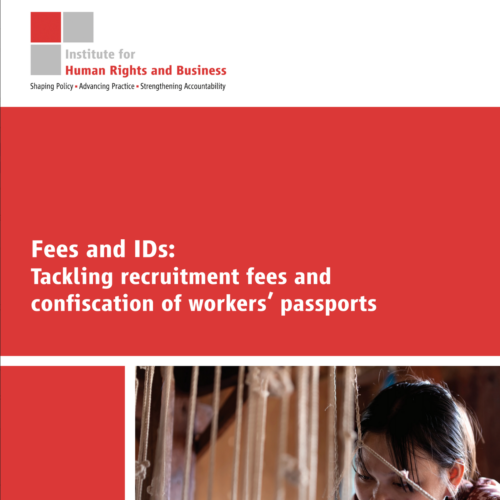 This is a guide produced by the think tank IHRB for tackling the exploitative recruiter practices of charging recruitment fees and confiscation of workers’ practices. The report gives background information regarding the extent of these practices, the current national and international legal frameworks, the business response to the problem and challenges to businesses, and ends with recommendations to businesses.
This is a guide produced by the think tank IHRB for tackling the exploitative recruiter practices of charging recruitment fees and confiscation of workers’ practices. The report gives background information regarding the extent of these practices, the current national and international legal frameworks, the business response to the problem and challenges to businesses, and ends with recommendations to businesses.Credit: Institute for Human Rights and Business (IHRB)
-
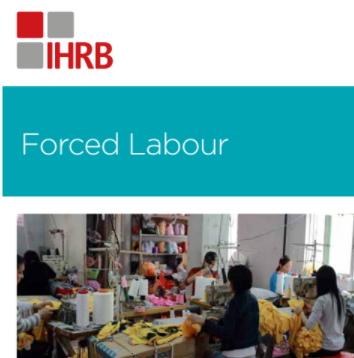 This is a briefing produced by the think tank IHRB on forced labour, its indicators and which industries are particularly affected. It covers how company practice can leave workers vulnerable to modern slavery and lists key standards that work to protect workers against the type of exploitation.
This is a briefing produced by the think tank IHRB on forced labour, its indicators and which industries are particularly affected. It covers how company practice can leave workers vulnerable to modern slavery and lists key standards that work to protect workers against the type of exploitation.Credit: Institute for Human Rights and Business (IHRB)
-
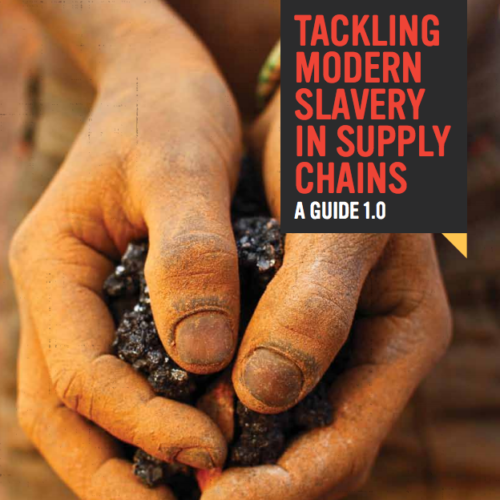 The Walk Free Foundation was established by Andrew Forrest, the Chairman of Fortescue Metals Group, after he found labour exploitation within his own supply chains and took a number of steps to prevent modern slavery affecting his business. This comprehensive guide considers corporate policy on modern slavery and provides both guidance and tools to implement it. It includes advice on corporate policy and provides template examples of a number of tools.
The Walk Free Foundation was established by Andrew Forrest, the Chairman of Fortescue Metals Group, after he found labour exploitation within his own supply chains and took a number of steps to prevent modern slavery affecting his business. This comprehensive guide considers corporate policy on modern slavery and provides both guidance and tools to implement it. It includes advice on corporate policy and provides template examples of a number of tools.Credit: Walk Free Foundation & Verite
-
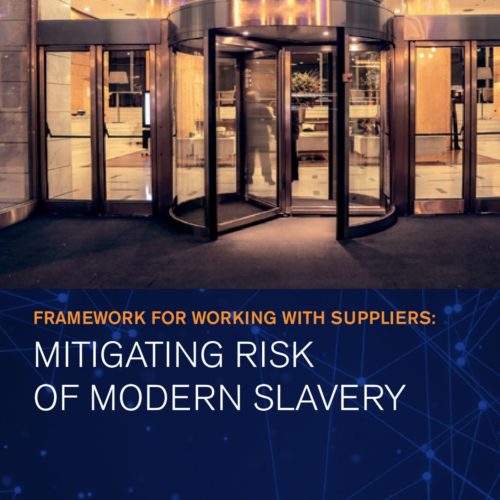 The Framework for Working with Suppliers: Mitigating Risk of Modern Slavery is a tool intended to be used by stakeholders at various levels of management within the hotel industry. It recommends specific responsibilities for brands, hotel owners and management companies, based on best practice and the experience and input of the Stop Slavery Hotel Industry Network (the "Network") membership. The Network brings together representatives from across the hotel industry to combat human trafficking and modern slavery within the sector. Its ethos stems from the acknowledgement that actors across the industry, whether international brands, bespoke hotel groups, independent owners, managers or employee agencies are all responsible for combating this horrific crime.
The Framework for Working with Suppliers: Mitigating Risk of Modern Slavery is a tool intended to be used by stakeholders at various levels of management within the hotel industry. It recommends specific responsibilities for brands, hotel owners and management companies, based on best practice and the experience and input of the Stop Slavery Hotel Industry Network (the "Network") membership. The Network brings together representatives from across the hotel industry to combat human trafficking and modern slavery within the sector. Its ethos stems from the acknowledgement that actors across the industry, whether international brands, bespoke hotel groups, independent owners, managers or employee agencies are all responsible for combating this horrific crime.Credit: Stop Slavery Hotel Industry Network
-
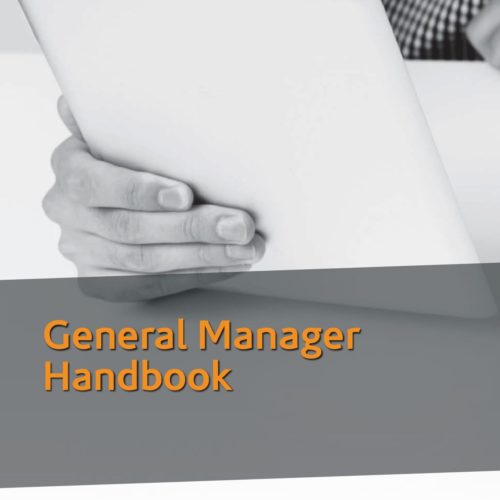 This Handbook is to be used by General Managers in conjunction with the Stop Slavery Blueprint. It offers practical tools to help operationalise the guidance from the Blueprint and provides example documents that can be adapted and used accordingly. The Stop Slavery Blueprint has been created by Shiva Foundation and was initially trialled in a group of hotels, with its implementation coordinated and supported by the Foundation. The Blueprint sets out the key principles for hoteliers wishing to implement their own anti-slavery initiatives.
This Handbook is to be used by General Managers in conjunction with the Stop Slavery Blueprint. It offers practical tools to help operationalise the guidance from the Blueprint and provides example documents that can be adapted and used accordingly. The Stop Slavery Blueprint has been created by Shiva Foundation and was initially trialled in a group of hotels, with its implementation coordinated and supported by the Foundation. The Blueprint sets out the key principles for hoteliers wishing to implement their own anti-slavery initiatives.Credit: Shiva Foundation
-
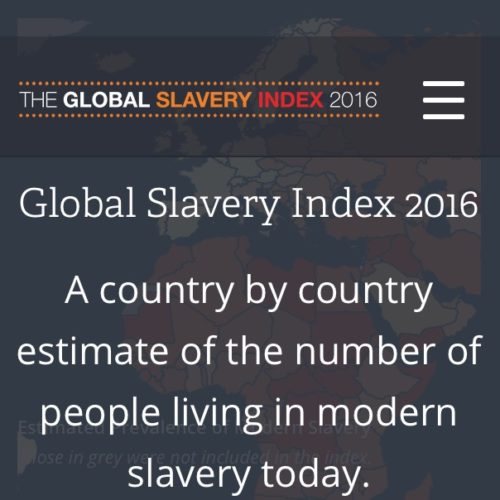 The Global Slavery Index provides a map, country by country, of the estimated prevalence of modern slavery, together with information about the steps each government has taken to respond to this issue. This information allows an objective comparison and assessment of both the problem and adequacy of the response in 167 countries.
The Global Slavery Index provides a map, country by country, of the estimated prevalence of modern slavery, together with information about the steps each government has taken to respond to this issue. This information allows an objective comparison and assessment of both the problem and adequacy of the response in 167 countries.Credit: Walk Free Foundation
-
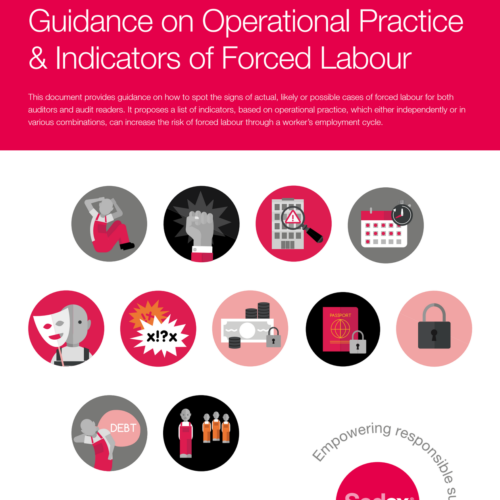 Sedex is a global NGO which provides the world's largest collaborative platform for sharing responsible sourcing data on supply chains. The Sedex Stakeholder Forum (previously the Associated Auditor Group) brings together brings together leaders across the ethical trade and responsible sourcing industry to discuss the challenges they collectively face and solve those problems collaboratively. This guidance provides information on how to spot signs of exploitation for auditors and audit readers. It includes a list of indicators of exploitation, based on operational practice, which can increase a person's risk to human trafficking. It also highlights the importance of protecting potential victims, and advises auditors on how to capture evidence and document potential exploitation of workers. It is intended for use by auditing bodies, ethical sourcing initiatives and brands to help them understand the risks of forced labour, and enhance their existing auditing protocols.
Sedex is a global NGO which provides the world's largest collaborative platform for sharing responsible sourcing data on supply chains. The Sedex Stakeholder Forum (previously the Associated Auditor Group) brings together brings together leaders across the ethical trade and responsible sourcing industry to discuss the challenges they collectively face and solve those problems collaboratively. This guidance provides information on how to spot signs of exploitation for auditors and audit readers. It includes a list of indicators of exploitation, based on operational practice, which can increase a person's risk to human trafficking. It also highlights the importance of protecting potential victims, and advises auditors on how to capture evidence and document potential exploitation of workers. It is intended for use by auditing bodies, ethical sourcing initiatives and brands to help them understand the risks of forced labour, and enhance their existing auditing protocols.Credit: Sedex
-
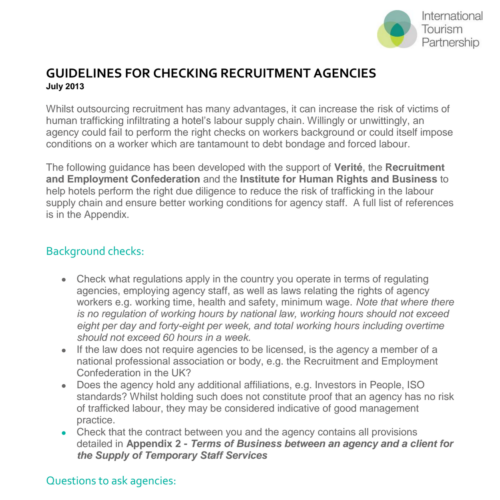 These guidelines were created by the ITP Anti-Trafficking Working Group made up of major hotel brands. This was done in consultation with Verite, the Recruitment and Employment Federation, and the Institute for Human Rights and Business. The guidelines include examples of conducting background checks on agencies, questions to ask agencies, document checks, and guidance on contracting. This resource gives examples of: - “Good Recruitment Charter” - Detailed Guidelines for Establishing Terms and Conditions with Recruitment Agencies
These guidelines were created by the ITP Anti-Trafficking Working Group made up of major hotel brands. This was done in consultation with Verite, the Recruitment and Employment Federation, and the Institute for Human Rights and Business. The guidelines include examples of conducting background checks on agencies, questions to ask agencies, document checks, and guidance on contracting. This resource gives examples of: - “Good Recruitment Charter” - Detailed Guidelines for Establishing Terms and Conditions with Recruitment AgenciesCredit: International Tourism Partnership
-
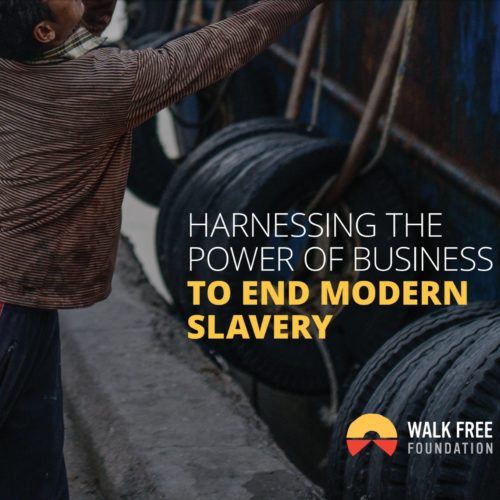 The Walk Free Foundation was established by Andrew Forrest, the Chairman of Fortescue Metals Group, after he found labour exploitation within his own supply chains and took a number of steps to prevent modern slavery affecting his business. This report provides an overview of modern slavery in a global context with statistics, case studies, and review of legislation and policy.
The Walk Free Foundation was established by Andrew Forrest, the Chairman of Fortescue Metals Group, after he found labour exploitation within his own supply chains and took a number of steps to prevent modern slavery affecting his business. This report provides an overview of modern slavery in a global context with statistics, case studies, and review of legislation and policy.Credit: Walk Free Foundation
-
 Hedging Risk by Combating Human Trafficking: Insights from the Private Sector is designed to help companies share best practices so they can mitigate their risks and help eliminate this heinous practice. In this first of a series, we highlight insights and technology-driven interventions in the hospitality, finance, and transportation industries.
Hedging Risk by Combating Human Trafficking: Insights from the Private Sector is designed to help companies share best practices so they can mitigate their risks and help eliminate this heinous practice. In this first of a series, we highlight insights and technology-driven interventions in the hospitality, finance, and transportation industries.Credit: World Economic Forum
-
 The GLAA (formerly GLA) is a non-departmental public body in the United Kingdom regulating the supply of workers to the agricultural, horticultural and shellfish industries, and any associated processing and packaging industries. It has been granted police-style powers to investigate labour abuse and exploitation across all aspects of the UK labour market. Specific public authorities now have a duty to notify the Secretary of State of any person in England and Wales suspected of being a victim of human trafficking. This 10 minute video is an excellent resource for demonstrating the methods traffickers use to entrap and exploit people through modern slavery. Credit: Gangmasters and Labour Abuse Authority
The GLAA (formerly GLA) is a non-departmental public body in the United Kingdom regulating the supply of workers to the agricultural, horticultural and shellfish industries, and any associated processing and packaging industries. It has been granted police-style powers to investigate labour abuse and exploitation across all aspects of the UK labour market. Specific public authorities now have a duty to notify the Secretary of State of any person in England and Wales suspected of being a victim of human trafficking. This 10 minute video is an excellent resource for demonstrating the methods traffickers use to entrap and exploit people through modern slavery. Credit: Gangmasters and Labour Abuse Authority -
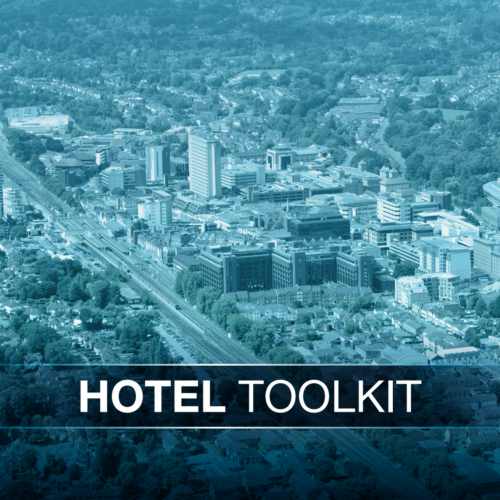 This toolkit was created by Surrey Police and is intended to provide staff working in the hotel industry with supporting information on how to act if they should encounter a human trafficking situation. The first section focuses on Operation Makesafe, which focuses on identifying victims of child sexual exploitation. The second section details action to take on encountering a potential victim.
This toolkit was created by Surrey Police and is intended to provide staff working in the hotel industry with supporting information on how to act if they should encounter a human trafficking situation. The first section focuses on Operation Makesafe, which focuses on identifying victims of child sexual exploitation. The second section details action to take on encountering a potential victim.Credit: Surrey Police
-
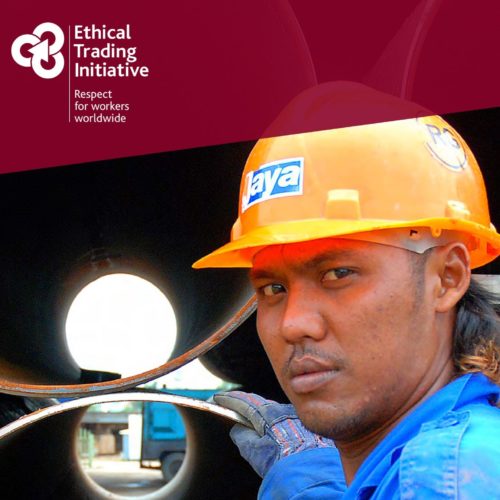 The Ethical Trading Initiative (ETI) is an alliance of companies, trade unions and NGOs that promotes workers' rights around the world. This guide is for companies to help them prevent and manage labour rights risks, and understand why engagement, negotiation and collaboration is key.
The Ethical Trading Initiative (ETI) is an alliance of companies, trade unions and NGOs that promotes workers' rights around the world. This guide is for companies to help them prevent and manage labour rights risks, and understand why engagement, negotiation and collaboration is key.Credit: Ethical Trading Initiative
-
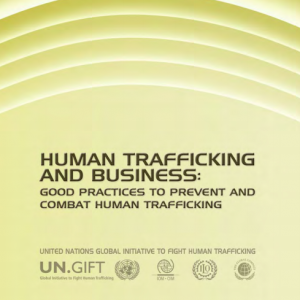 This report presents an introduction and overview of human trafficking and the role that business can play in addressing it. It draws from key case studies to illustrate some of the many ways employers can practically address human trafficking.
This report presents an introduction and overview of human trafficking and the role that business can play in addressing it. It draws from key case studies to illustrate some of the many ways employers can practically address human trafficking.Credit: UN Global Initiative to Fight Human Trafficking
-
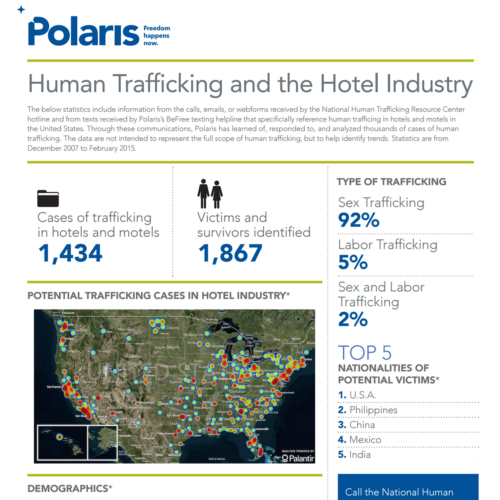 This infographic factsheet from Polaris has been put together using statistics from the National Human Trafficking Resource Centre hotline and texts from the Polaris BeFree texting helpline. It specifically references human trafficking in hotels and motels in the US. The data is used to identify trends in cases and indicators of sex and labour trafficking in hotels, and the factsheet provides recommendations for the hotel industry.
This infographic factsheet from Polaris has been put together using statistics from the National Human Trafficking Resource Centre hotline and texts from the Polaris BeFree texting helpline. It specifically references human trafficking in hotels and motels in the US. The data is used to identify trends in cases and indicators of sex and labour trafficking in hotels, and the factsheet provides recommendations for the hotel industry.Credit: Polaris Project
-
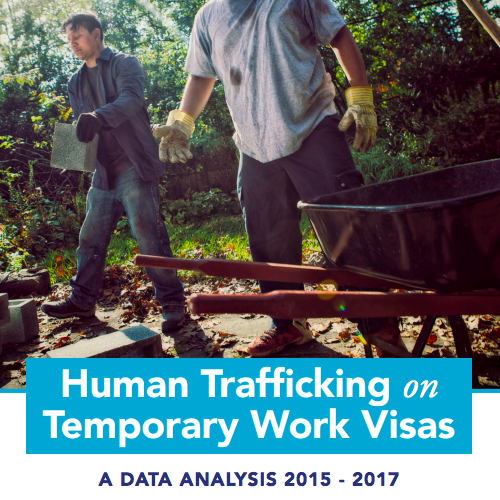 This report highlights the destructive practice of labour trafficking on temporary work visas, how the system is flawed, and the steps needed to fix it. From 2015-2017, Polaris collected data on the US temporary work visa system and identified some 800 victims of human trafficking who held temporary work visas at the time of their abuse.
This report highlights the destructive practice of labour trafficking on temporary work visas, how the system is flawed, and the steps needed to fix it. From 2015-2017, Polaris collected data on the US temporary work visa system and identified some 800 victims of human trafficking who held temporary work visas at the time of their abuse.Credit: Polaris
-
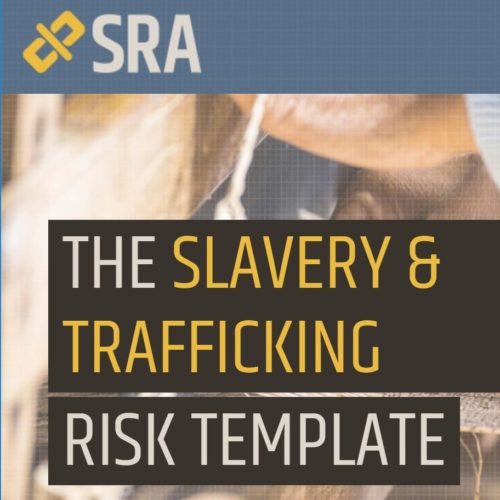 The Slavery and Human Trafficking Risk Template (STRT) is a free, open-source data collection template that forms the backbone of corporate modern slavery due diligence programs. It is maintained by a Development Committee committed to ensuring it keeps stride with new research and evolving industry needs. It is housed under the Social Responsibility Alliance, an initiative dedicated to providing companies with the open-source data collection tools they need to build socially responsible supply chains.
The Slavery and Human Trafficking Risk Template (STRT) is a free, open-source data collection template that forms the backbone of corporate modern slavery due diligence programs. It is maintained by a Development Committee committed to ensuring it keeps stride with new research and evolving industry needs. It is housed under the Social Responsibility Alliance, an initiative dedicated to providing companies with the open-source data collection tools they need to build socially responsible supply chains.Credit: Social Responsibility Alliance
-
 The ITP engages with the world's leading hotel companies to drive responsible business in the hotel industry. They offer best practice, practical tools and programmes to facilitate collaboration. This guide was developed to help hoteliers understand human trafficking, the risk of the issue affecting them and their business, and what they can do to combat the problem.
The ITP engages with the world's leading hotel companies to drive responsible business in the hotel industry. They offer best practice, practical tools and programmes to facilitate collaboration. This guide was developed to help hoteliers understand human trafficking, the risk of the issue affecting them and their business, and what they can do to combat the problem.Credit: International Tourism Partnership (ITP)
-
 Stronger Together is a multi-stakeholder initiative which aims to reduce modern slavery. It provides guidance, training and resources to organisations, employers, labour providers, workers and their representatives. This free collection of resources includes pragmatic guidance and toolkits, and resources for the workplace including multilingual posters, leaflets and template policies. This guidance is intended for tenants renting home privately in the UK. It includes both obligations of the landlord and of tenants, and provides contact and advice helplines.
Stronger Together is a multi-stakeholder initiative which aims to reduce modern slavery. It provides guidance, training and resources to organisations, employers, labour providers, workers and their representatives. This free collection of resources includes pragmatic guidance and toolkits, and resources for the workplace including multilingual posters, leaflets and template policies. This guidance is intended for tenants renting home privately in the UK. It includes both obligations of the landlord and of tenants, and provides contact and advice helplines.Credit: Stronger Together
-
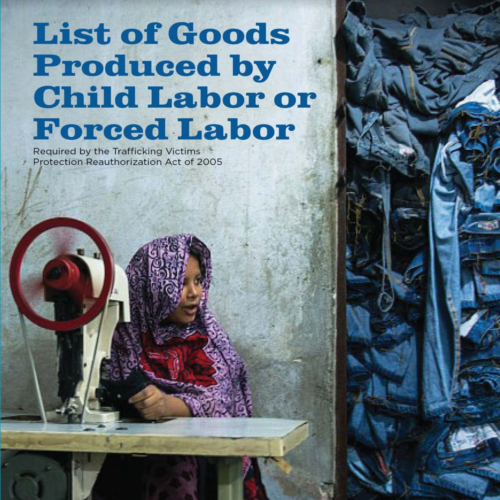 The US Department of Labor maintains a list of goods and their source countries which it believes likely to have been produced by child labour or forced labour in violation of international standards. It is not an exhaustive list and is primarily intended to raise public awareness, but is a useful starting point for considering the origins of any products bought for use by and within the hotel.
The US Department of Labor maintains a list of goods and their source countries which it believes likely to have been produced by child labour or forced labour in violation of international standards. It is not an exhaustive list and is primarily intended to raise public awareness, but is a useful starting point for considering the origins of any products bought for use by and within the hotel.Credit: US Government
-
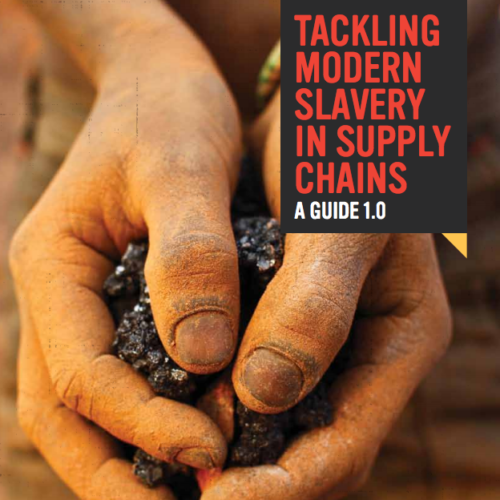 The Walk Free Foundation was established by Andrew Forrest, the Chairman of Fortescue Metals Group, after he found labour exploitation within his own supply chains and took a number of steps to prevent modern slavery affecting his business. This comprehensive guide considers corporate policy on modern slavery and provides both guidance and tools to implement it. It includes advice on corporate policy and provides template examples of a number of tools.
The Walk Free Foundation was established by Andrew Forrest, the Chairman of Fortescue Metals Group, after he found labour exploitation within his own supply chains and took a number of steps to prevent modern slavery affecting his business. This comprehensive guide considers corporate policy on modern slavery and provides both guidance and tools to implement it. It includes advice on corporate policy and provides template examples of a number of tools.Credit: Walk Free Foundation & Verite
-
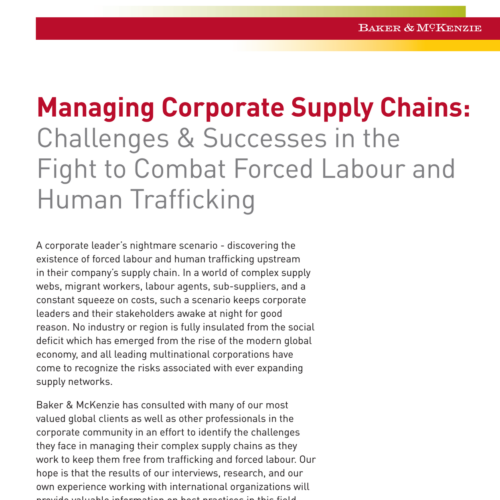 This guide is published by a law firm with expertise providing modern slavery related advice to business. It gives a good overview of the scope of the problem of trafficking in supply chains, and what existing support there is for business. It looks at the legal mechanisms already in place to protect against modern slavery in corporate supply chains, as well as the successes and challenges of corporate initiatives, and solutions to the problem.
This guide is published by a law firm with expertise providing modern slavery related advice to business. It gives a good overview of the scope of the problem of trafficking in supply chains, and what existing support there is for business. It looks at the legal mechanisms already in place to protect against modern slavery in corporate supply chains, as well as the successes and challenges of corporate initiatives, and solutions to the problem.Credit: Baker McKenzie
-
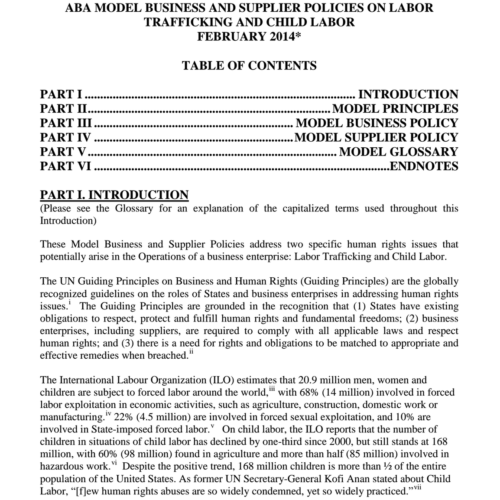 These model principles are intended for both businesses and suppliers that do not currently have policies relating to labour trafficking and child labour, and for those that do but want to adapt them to reflect evolving practices. Included are examples of model policies and principles that can be incoporated into codes of conduct or current business policies.
These model principles are intended for both businesses and suppliers that do not currently have policies relating to labour trafficking and child labour, and for those that do but want to adapt them to reflect evolving practices. Included are examples of model policies and principles that can be incoporated into codes of conduct or current business policies.Credit: American Bar Association
-
 Stronger Together is a multi-stakeholder initiative which aims to reduce modern slavery. It provides guidance, training and resources to organisations, employers, labour providers, workers and their representatives. This free collection of resources includes pragmatic guidance and toolkits, and resources for the workplace including multilingual posters, leaflets and template policies. These seven principles have been agreed upon by the supermarket businesses sponsored by Stronger Together. The list includes "common principles" for the businesses' supply chains partners to follow when completing modern slavery statements.
Stronger Together is a multi-stakeholder initiative which aims to reduce modern slavery. It provides guidance, training and resources to organisations, employers, labour providers, workers and their representatives. This free collection of resources includes pragmatic guidance and toolkits, and resources for the workplace including multilingual posters, leaflets and template policies. These seven principles have been agreed upon by the supermarket businesses sponsored by Stronger Together. The list includes "common principles" for the businesses' supply chains partners to follow when completing modern slavery statements.Credit: Stronger Together

